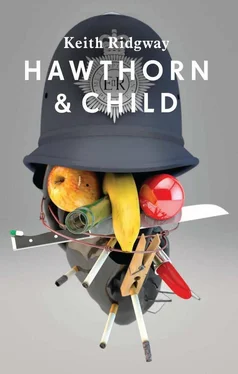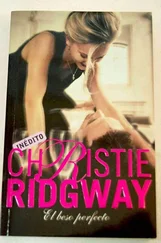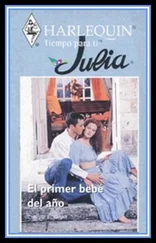— Me? Yes.
— What about Daniel? Do you know if he was doing anything unusual this weekend?
— Not that I know of. I don’t know. He was out late on Saturday. He slept late yesterday. But that’s not unusual is it?
— Did he have anyone to stay?
— Not that I saw.
— Would you, typically, see people that Daniel had over?
— Sometimes, probably. On a weekend, yes, usually.
— Does he have a lot of people to stay?
She shrugged and smiled.
— What’s a lot? More than I do, that’s for sure.
— Anyone regular?
— Not lately, no.
— We’re not investigating anything other than Daniel’s shooting, but I need to ask you whether Daniel uses any drugs.
— How is that relevant?
She looked at Child, but she didn’t seem particularly surprised.
— Well it may not be. But most violent crime in this city is drug related.
She thought for a moment.
— He smokes the occasional joint. That’s all I know about. I’m sure that’s all he does.
— Where does he get it?
She hesitated, glanced at the door.
— Walter usually has some. He gets a little extra sometimes and Dan and I will have some.
— Does he get it locally?
— No, at uni I think. He knows someone. We haven’t had any in ages. Well, I haven’t. And I don’t think Dan has either.
Hawthorn cleared his throat.
— Do you know anyone who drives a vintage car?
Child looked at him.
— No.
— Anyone who has an old car, or an unusual one? A kit car or anything?
— I don’t know what a kit car is. I don’t know anyone who has any kind of car. Except our neighbours. Some people at work I suppose. I don’t really know anything about cars. Why?
He didn’t feel able to tell her. He wasn’t sure why. He shrugged.
— It’s not important, said Child. Do you pay Walter for the extra that he gets?
— Yes. Or Dan does, usually. It’s not very much. A fiver here and there.
— Would you mind, Hawthorn interrupted, if I had a look around?
— Go ahead.
Child closed his eyes briefly, gave a low sigh. Hawthorn smiled at Alison Gayle.
It was a warm, well-kept house. There were wooden floors, good rugs, framed prints on the walls. But there were pieces of old, solid furniture as well. The heavy, dark kitchen table. A dresser in the hallway. Bookcases in the living room that looked made for the space.
He stood in front of them. There was a large television and a games console. In the bookcases, as well as books, there were two shelves full of DVDs and some games. On one shelf there were a lot of old black-and-white films — Ealing comedies, World War II movies, lots of Hitchcock. On the other, science fiction, including TV box sets of American shows that Hawthorn recognized. The games meant nothing to him.
There were three doors off the first floor landing. The bathroom door was open and a warm mist hung in its bright light. Hawthorn paused. He could hear a radio, he thought, behind one of the closed doors. He continued up the stairs. The top floor landing was slightly smaller than the one below it. Three doors again. Hawthorn opened them.
One was a cupboard with water tanks and wooden shelving and piles of towels and bedding. The other was a small bathroom. No bath, just a shower unit, sink and toilet. It looked recently installed. There was a small stack of magazines on the window sill. Everything was clean.
The bedroom was dark, the curtains drawn. He stood in the doorway and flicked the light switch and stepped in. He closed his eyes, briefly. He inhaled. He reached out and switched the light off again. Then he switched it on. He reached for his notebook.
The bed was unmade. A duvet was piled up at its centre as if picked up and thrown there. There was a large wicker laundry basket by the door, beside a wardrobe. There was a desk to the left of the bed. There were some cables sitting on it, for his laptop presumably. There was a hard drive. There was a phone charger. Hawthorn ducked and saw a large plug-board under the table, switched off at the socket, which was to the right, under the window. There was a bedside table — a little two-drawer locker — with a lamp, a clock radio and a glass of water sitting on it. On the other side of the bed there was a chest of drawers. A couple of jumpers sat neatly folded on top. There was a pair of jeans on the floor. There was a bookcase. It was full, mostly with books, though there were also some DVDs and CDs. There were two framed prints on the wall above the desk. One was an art deco poster advertising the tube. The other was a poster for a film, or perhaps a comic book, in French.
Hawthorn switched off the light again. The curtains were heavy. They excluded most of the day. The alarm clock had green digits. There was something glinting in the corner. He switched the light on. It was a tin on the lowest of the bookshelves. A metal box. A tin. A container. Little things were perched in front of the books all over the bookshelves. Little toy-like things. A ring. An old lighter. A London snow globe. There was an iPod box, a camera, a pair of gloves. There were a couple of photographs in frames. Some postcards.
Hawthorn went over and looked at the photographs. He assumed the mother, the sister. There was a family portrait a few years old. A younger Daniel, his hair longer, his mother and sister, a man with sunglasses, his arms folded. There were two postcards. One was signed Dad . It showed an old-fashioned space rocket standing upright against a blue sky. It was from the NASA Space Centre in Houston. Hawthorn couldn’t read the writing on the other one. It showed a view of Prague.
He walked to the door and looked out. He listened. He walked over to the stairs and looked down and listened. He could still hear the low sound of the radio on the floor below. Nothing else. He went back to the doorway of the bedroom. He turned the light off again.
He didn’t move at all for a while. Then he walked quickly into the room, slipping off his jacket and kicking off his shoes. He took the duvet and spread it out properly. He looked at the door for a moment, and then he lifted the corner of the duvet and climbed into the bed.
He stared at the ceiling. The room was cold. He sniffed. He moved his legs. Then he shifted on to his left side, facing the bookcase. His left arm came out and draped itself across the pillows. He stayed like that for a couple of minutes, sniffing. Then he turned on to his right side, facing the little bedside table. He lay still for a while. Then he propped himself up on his elbow and turned on the bedside lamp.
The top drawer was full of socks and underwear. He rummaged a little and came up with two cufflink boxes, a tiepin and a pair of cheap flip-flops. In the lower drawer there were condoms, a bottle of poppers, various …
He heard a noise.
He switched off the lamp. Closed the drawer.
Nothing happened. He couldn’t hear it now.
Then he heard a creak, like a floorboard. A door closed. Below him somewhere. There was a small silence, and then the sound of someone trotting down the stairs. Or up the stairs. Up the stairs.
He lay back on the bed. He slid down so that his head was off the pillow, flat on the mattress. A figure appeared in the doorway. It seemed to pause. To look into the room. Hawthorn could see a silhouette only, and only the upper part of that. It looked like a little old man, hunched over, regarding him, tilting his head, considering Hawthorn. Sniffing. It sniffed. It seemed to stay still for a long time. Hawthorn did not breathe. He did not move his eyes. The silhouette reached out towards him. It seemed to. Then it was gone. There was the click of the airing-cupboard door opening. And a silence. Then the same click again. Closing. There were human noises — a half cough, a throat clearing, another sniff. Then feet, trotting down the stairs.
Читать дальше












